First-rate Filipino food? Try heading to the supermarket

- Share via
The cooking usually starts around sunrise at Greenhills Market & Fast Food, a popular Filpino grocery store and restaurant in the Inland Empire city of Ontario.
By the time the store opens at 9 a.m., a long row of steam tables near the entrance entices with two dozen freshly prepared dishes. Like many Filipino markets in Southern California, Greenhills offers turo turo, a casual style of dining that translates to “point point” in Tagalog.
The concept is straightforward: Point out what you want from the colorful display, a reflection of the famously multifaceted foodways of the Philippines. A combo plate might involve a heaping scoop of one or two main dishes, called ulam, plus a generous portion of steamed rice and a complimentary cup of sinigang, a savory soup whose broth is zapped into tartness by unripe green tamarind.
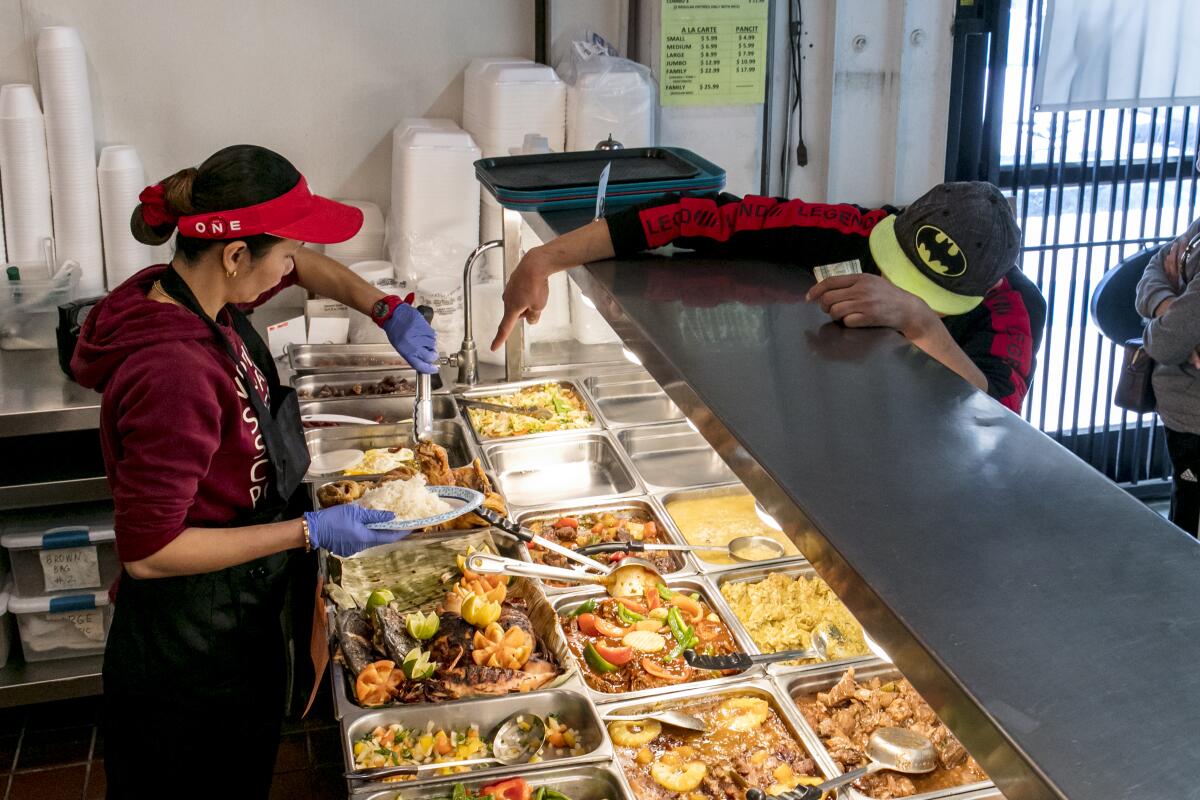
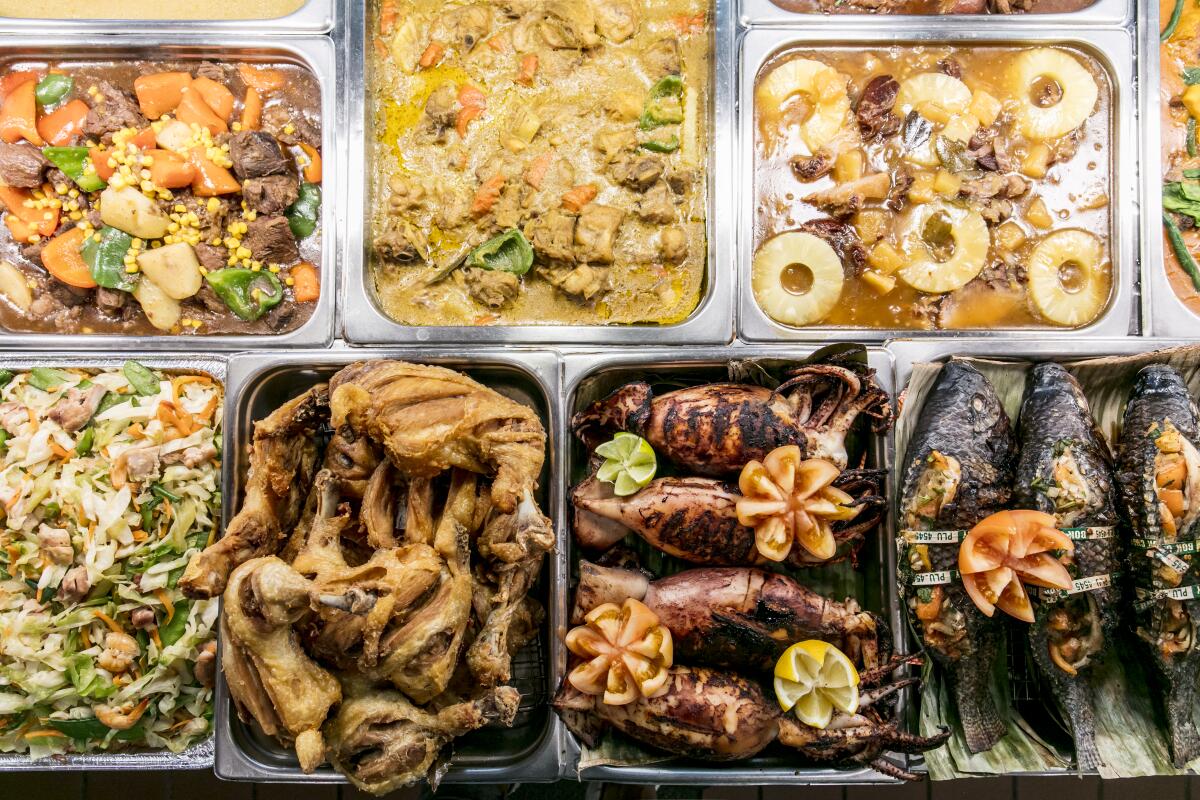
Even as the number of sit-down Filipino restaurants increases locally, turo turo remains the ubiquitous format for how Filipino cuisine is served in L.A., the city that is home to the largest Filipino American community in the country.
On Mondays at Greenhills, there is the rich oxtail stew kare-kare, laced with crushed peanuts and shrimp paste, braised beef shank with cabbage and neatly stacked trays of fried chicken and fried fish. Wednesdays bring arroz caldo, bitter melon sauteed with shrimp, ink-stained squid adobo and the hulking eggplant omelet known as tortang talong.
Those brave enough to battle the post-church crowd on Sundays are rewarded with pinapaitan, a bitter-sour Ilocano soup kitted out with goat offal, and the stewed coconut-and-tapioca dessert ginataang halo halo.
In the hands of a gifted chef, a dish can operate rather like an object lesson, the pattern of sauce and arrangement of ingredients demonstrating her relationship to a cuisine, a memory, a culture.
Hidden in the far corner of a byzantine strip mall next to a Sears appliance outlet, Greenhills does not announce its presence loudly to passersby. But for the last 18 years, the mom-and-pop operation, named for a famous shopping district in metro Manila, has steadily supplied the area’s Filipino community with an array of familiar flavors.
Beside shelves stocked with Mama Sita seasoning packets and SkyFlakes saltines, you’ll find a robust produce section (fresh calamansi), baked goods (ensaymadas), a full-service butcher (suckling pig). Staff at the impressively stocked seafood counter will fry, grill or steam any fish at no extra charge. At Greenhills, along with a meal, you can transfer money to the Philippines, buy Filipino lottery tickets or send a balikbayan box to relatives back home.
Still, it’s all secondary to those steam tables.
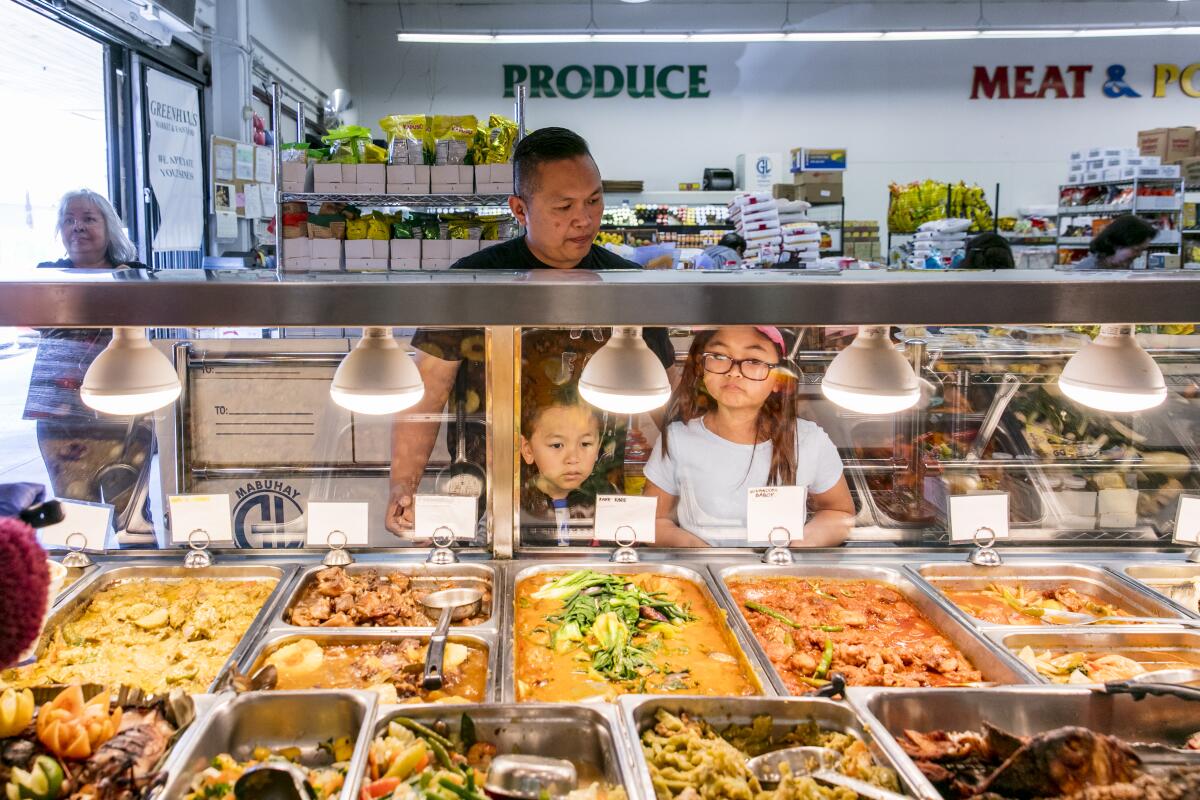
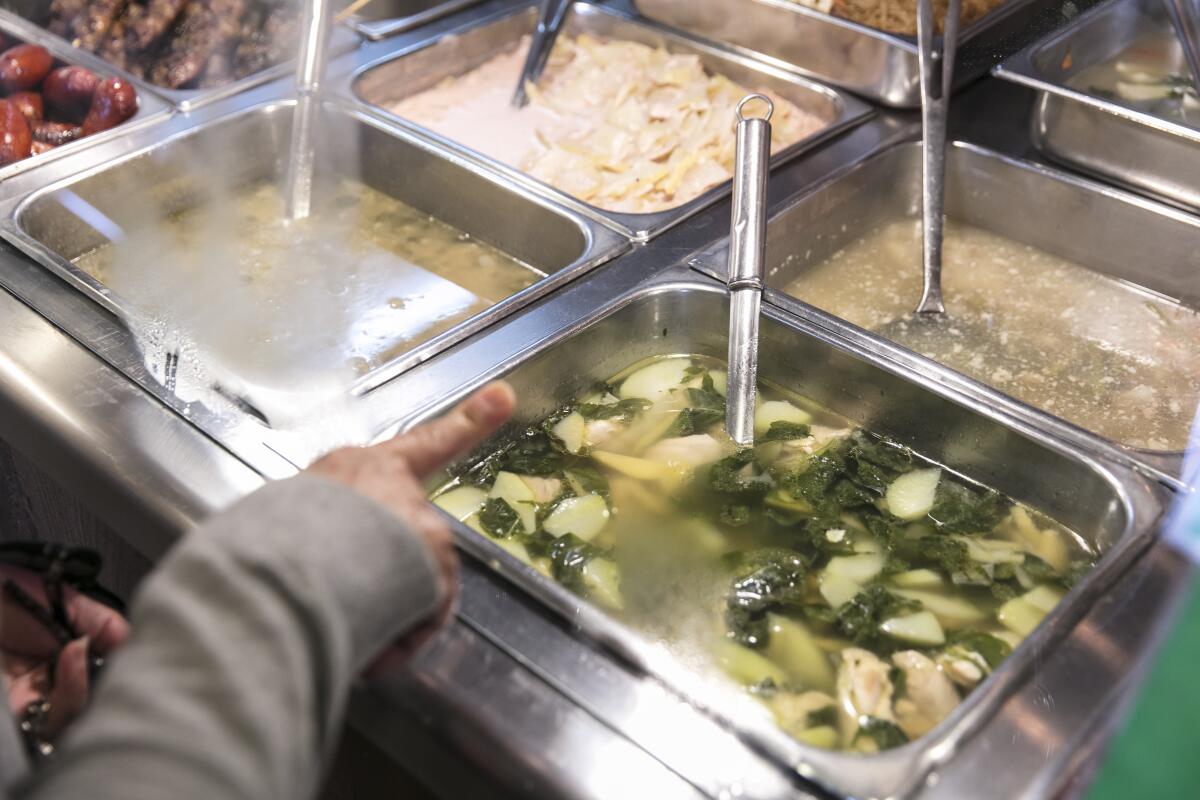
“Most of our customers know us for our food selection,” says Patrick Tan, a co-owner and operations manager at Greenhills. “They’ll come in to eat lunch, then order more to take home to their families.”
Affordability, convenience and comfort are part of what explains the popularity of turo turo among first generation immigrants, said Teena Apeles, an author and editor who is currently developing a book featuring Filipino American food stories and recipes from L.A.
“There’s an energy and a warmth to these spaces that creates a sense of family. The older businesses are usually family-owned, they usually have a TV tuned to a Filipino channel, the tables are a little cluttered. It’s almost like being at your lola’s [grandmother’s] house,” she said. “Even for my parents now, the concept of ordering off a menu seems weird. They want to be able to see the food, they want the immediacy, versus ordering off a menu. It’s the oohs and aahs of having everything laid out in front of you ready to eat.”

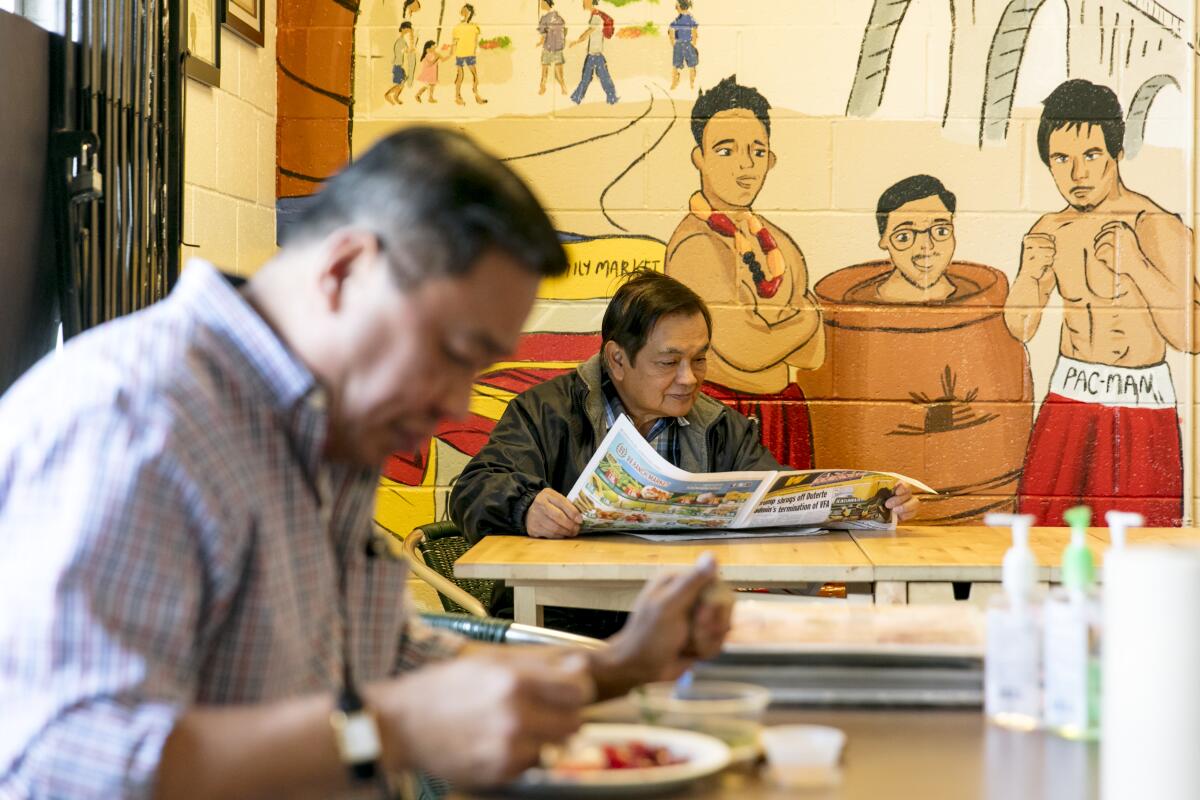
When Greenhills’ previous owners retired in 2017, Tan, along with Larry Lim, a former Costco manager, and Angela Lim, a former nurse, took over the business. Expanding the turo turo section became one of their first priorities. They added a handful of tables and chairs near the steam tables so customers could dine inside. They enlisted head chef Francisco “Chito” Reyes, a third-generation cook, to expand the menu and offer a greater variety of vegetable dishes.
“I originally went there to buy ingredients,” said Marvin Gapultos, a cookbook author and chef who lives in nearby Eastvale. “But at some point, I tried the food. Since then, I’ve been hooked. On weekends, I’ll take my kids and we’ll get Filipino breakfast, where you choose the protein and it comes with garlic rice and a fried egg. It’s comfort food, like what my mom might make.”
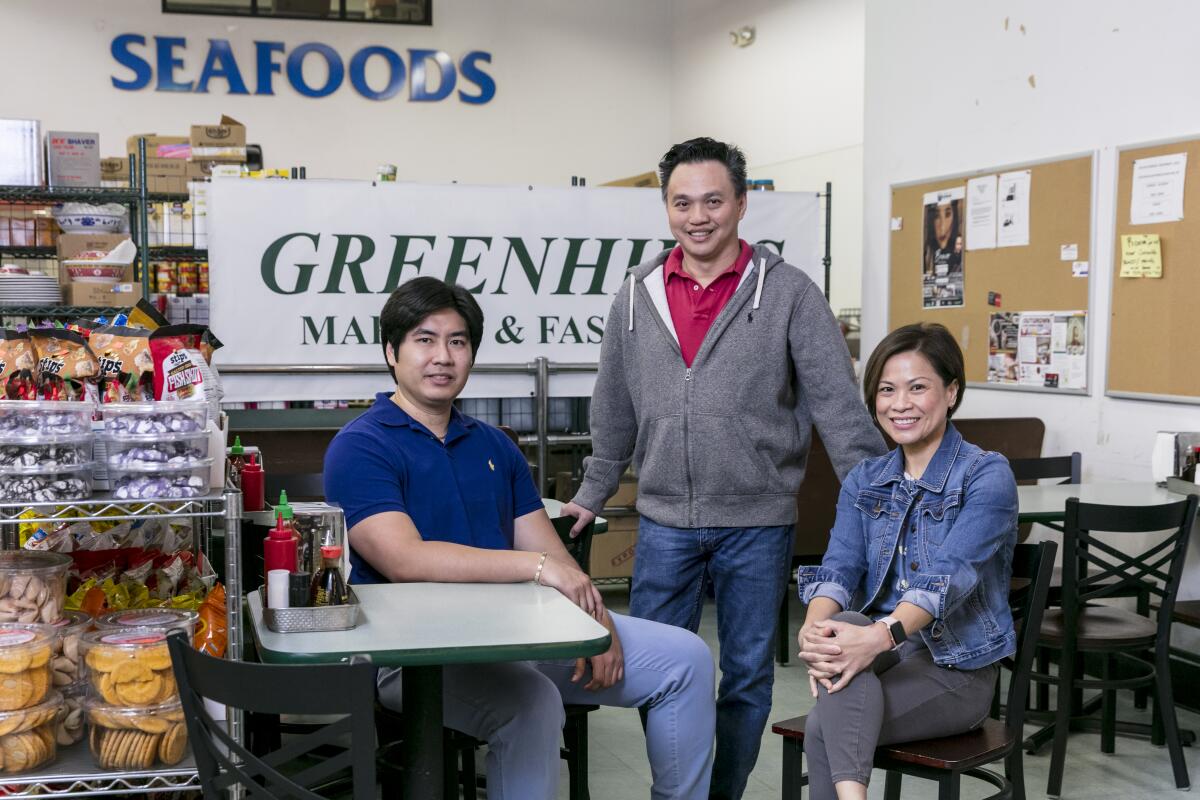
Greenhills isn’t alone. The prolific Filipino supermarket chain Seafood City, which operates eight locations in Los Angeles County, has its own dedicated turo turo concepts, the invitingly named Grill City and Crispy Town. At locations of Island Pacific Seafood Market, a station called PhilHouse dishes out chicken adobo and pancit palabok. American Ranch & Seafood Market in Artesia is home to MGA Lutong Bahay, a busy turo turo counter whose name translates to “home cooking.”
Turo turo restaurants in L.A. are not confined to grocery stores. Chains like Manila Sunset, Pinoy-Panay and DJ Bibingkahan, as well as countless mom-and-pop turo turo shops, are fixtures in the county’s many Filipino enclaves, including Eagle Rock, Carson, Cerritos, West Covina, Panorama City, East Hollywood and Historic Filipinotown.
For volume and variety, however, rare is the strip mall turo turo that can compete with the culinary largesse of a supermarket, many of which have the ability to purchase produce for their kitchens in greater quantities, hire more staff and boast a larger customer base to spur the regular turnover of dishes.
“The kitchen prepares food throughout the day, which means everything stays fresh and there’s very little waste,” Tan says. “We call it fast food because you can order it quickly, but in reality most dishes take hours to prepare.”

Susie Fong, the 55-year-old matriarch behind Glendale’s Arko Foods International, one of the oldest operating Filipino turo turo supermarkets on the West Coast, has seen firsthand how these businesses have become a bedrock of the community.
Fong, who immigrated to the U.S. in 1983 to help her mother run Arko, said many of her Filipino customers are not just seeking out ingredients but also prepared versions of dishes they crave from home.
“The biggest factor was time,” she says. “Most Filipinos who immigrated here worked long hours, and afterward they wanted to spend time with their family. If you’re being paid $50 or $60 an hour as a nurse, it’s not worth spending two hours to cook dinuguan or adobo when you can pick it up on the way home.”
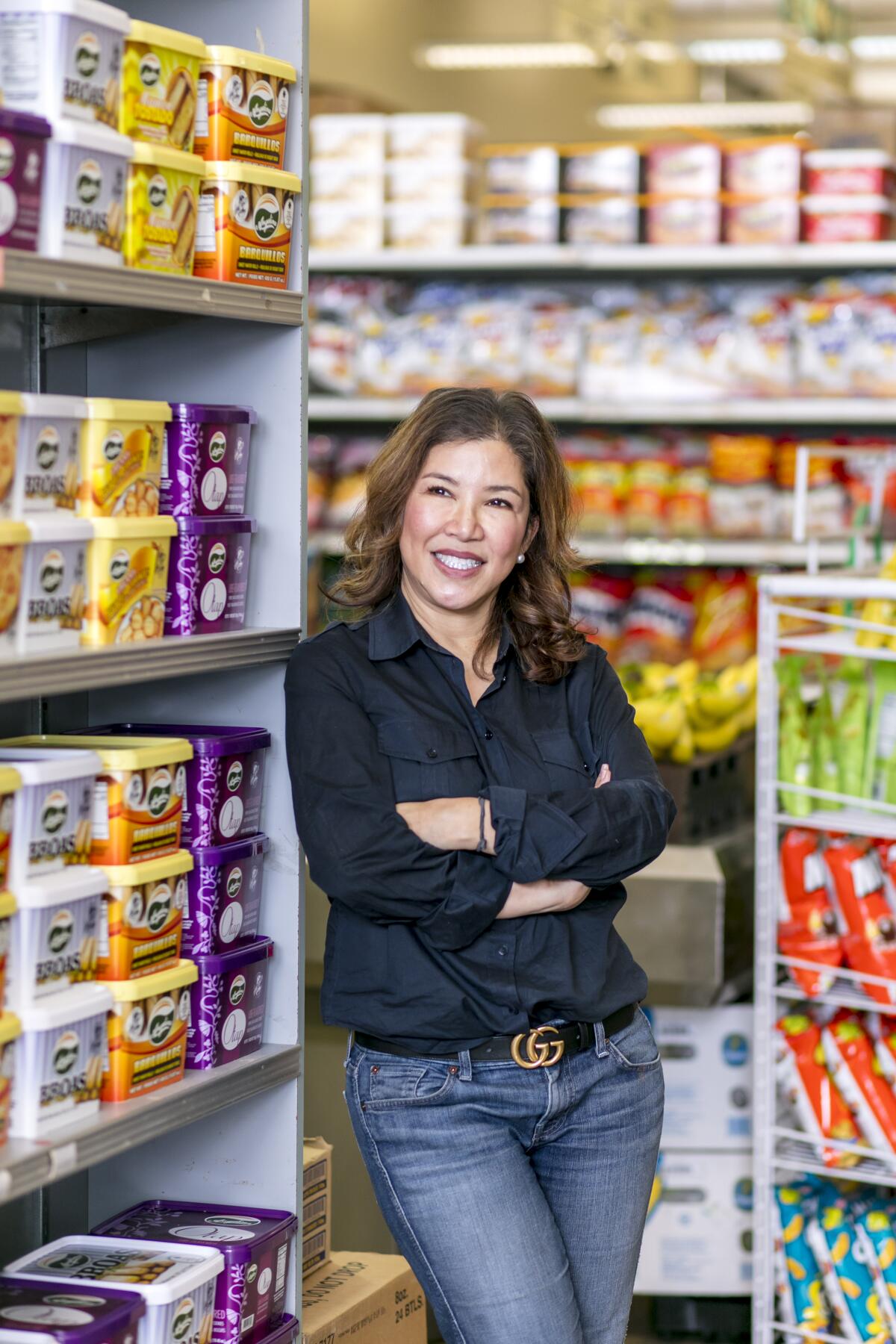
The demand for Arko’s no-frills home-style cuisine hasn’t stagnated as the city’s Filipino population has become more entrenched. In 2004, it moved from its longtime 3,000-square-foot space into a sprawling former Bank of America branch across the street, complete with a sizable kitchen area that can support the rigors of prepping and cooking for hundreds of customers every day (since its relocation, Arko has remained open 365 days a year).
The 60-foot, glass-enclosed steam table counter that is the market’s centerpiece holds 50 or so dishes, which rotate throughout the day: crispy sisig, laing (creamed taro leaves), tinola (ginger chicken soup), mechado (tangy beef stew), igado (braised liver) or ginataang langka (jackfruit simmered in coconut milk). “We have street foods, like pork barbecue, dried fish, lumpia,” says Fong, talking through the nearly 100 dishes her kitchen produces daily. “We have salads and cold dishes. There is one cook whose only job is to make different kinds of dessert.”
Many of the few dozen cooks and cashiers at Arko have been employees for decades, according to Fong. “Our head chef is from the Ilocos region. We have another chef from Pampanga, one from Visaya, one from Batangas. We serve dishes from all across the Philippines.”
Over the last decade, contemporary restaurants such as Lasa, Ma’am Sir, Sari Sari Store and the Park’s Finest have helped expand L.A.’s notion of what Filipino cuisine can be and how it is presented, particularly among non-Filipinos. Fong is optimistic that this heightened awareness will translate to a wider appreciation for the traditional cooking found at turo turos. “Now is the time for this kind of Filipino food to be in the spotlight,” she says.
Charles Olalia, the chef of Ma’am Sir, who has made his reputation serving upscale renditions of traditional Filipino fare, is gambling on that possibility. He said he plans to open a small restaurant and market — a mini version of the combination supermarket-turo turo — somewhere near downtown later this year and is thinking of calling it Turo Turo 1-2-3.
“The multisensory experience you get eating at a turo turo is something I’m drawn to,” Olalia says. “It’s like a portal to the Philippines.”
At Chaaste Family Market in Pasadena, the 32-year-old Filipino grocery store and turo turo restaurant run by the Esteban family has gained new life through its second generation of owners. When brothers Christian, 37, Abraham, 33, and Gabriel, 29, learned their father had been diagnosed with dementia, they left their lives in the Philippines to return home and help their mom run the store she’d founded three decades earlier.
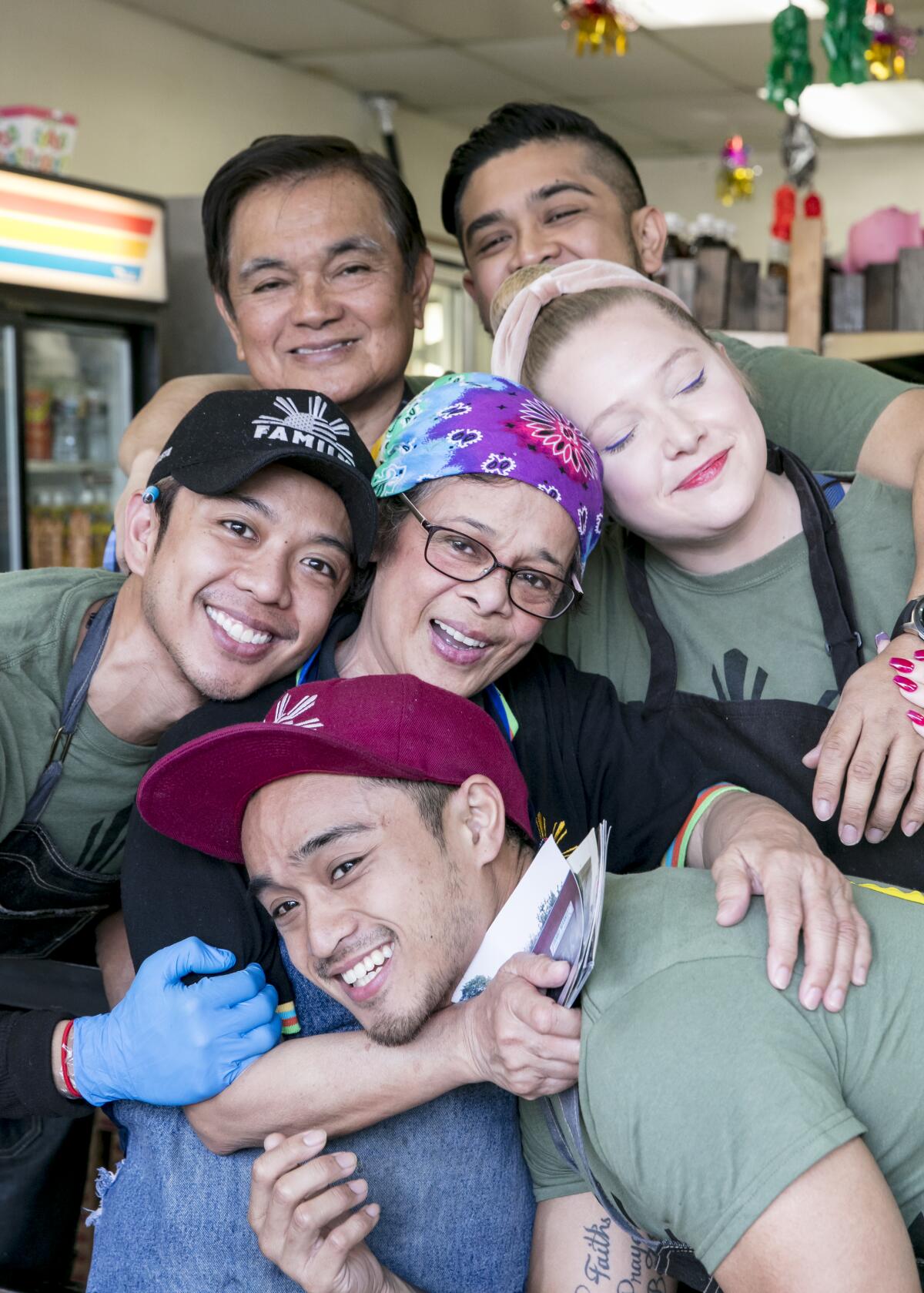
They considered changing the place up to serve what they consider “fusion” food — Gabriel attended culinary school in the Philippines — but, with encouragement from Filipino American chefs like Isa Fabro, Margarita Manzke and Chad Valencia, they decided to continue offering the dishes the market had built its legacy around.
“Our family was one of the first Filipino families to settle in the Pasadena area, so there was a lot of pride involved. I remember my mom’s exact words,” Christian says with a laugh: “Over my dead body. You’re not having no fusion here.”
Since the brothers took over the market in 2014, business has improved year over year. Aside from the trays of bicol express (pork braised with coconut and chiles) and chicken afritada (spiced tomato stew) that feed lunchtime crowds, Chaaste has become well known for its turon, a sweet banana-filled lumpia that’s deep-fried and glazed with brown sugar. Like everything else in the store, the recipe is based on what Mom made.
“Growing up in Pasadena, to me, turo turo was something that was almost too Filipino, especially as the one Asian in my class who just wanted to do what the white kids were doing,” Christian says. “But when I went to school in the Philippines and actually spent time eating at those places and building relationships, I started to understand why my mom opened the market and what it meant to our customers. It’s about community as much as food.”
More to Read
Eat your way across L.A.
Get our weekly Tasting Notes newsletter for reviews, news and more.
You may occasionally receive promotional content from the Los Angeles Times.










